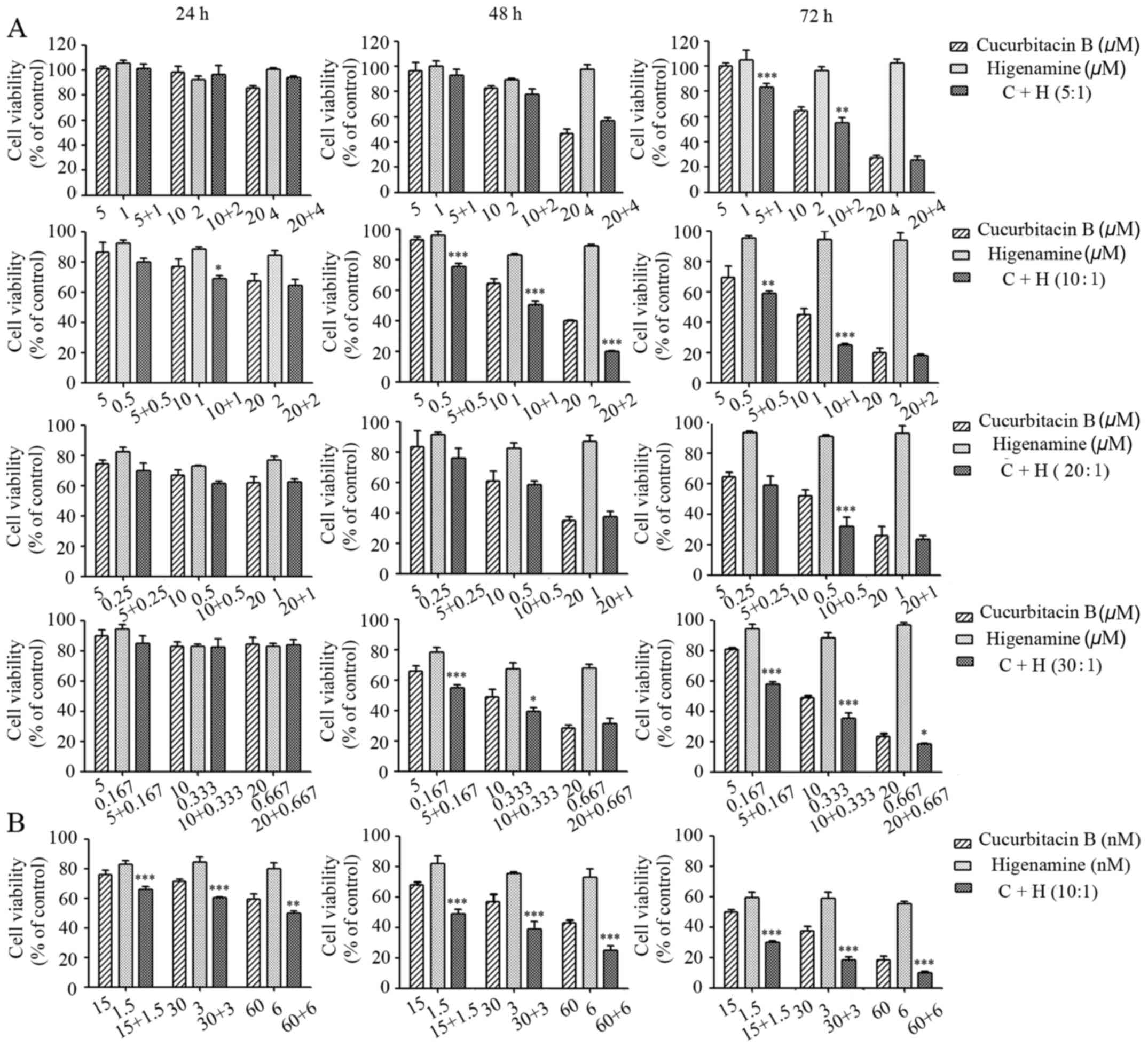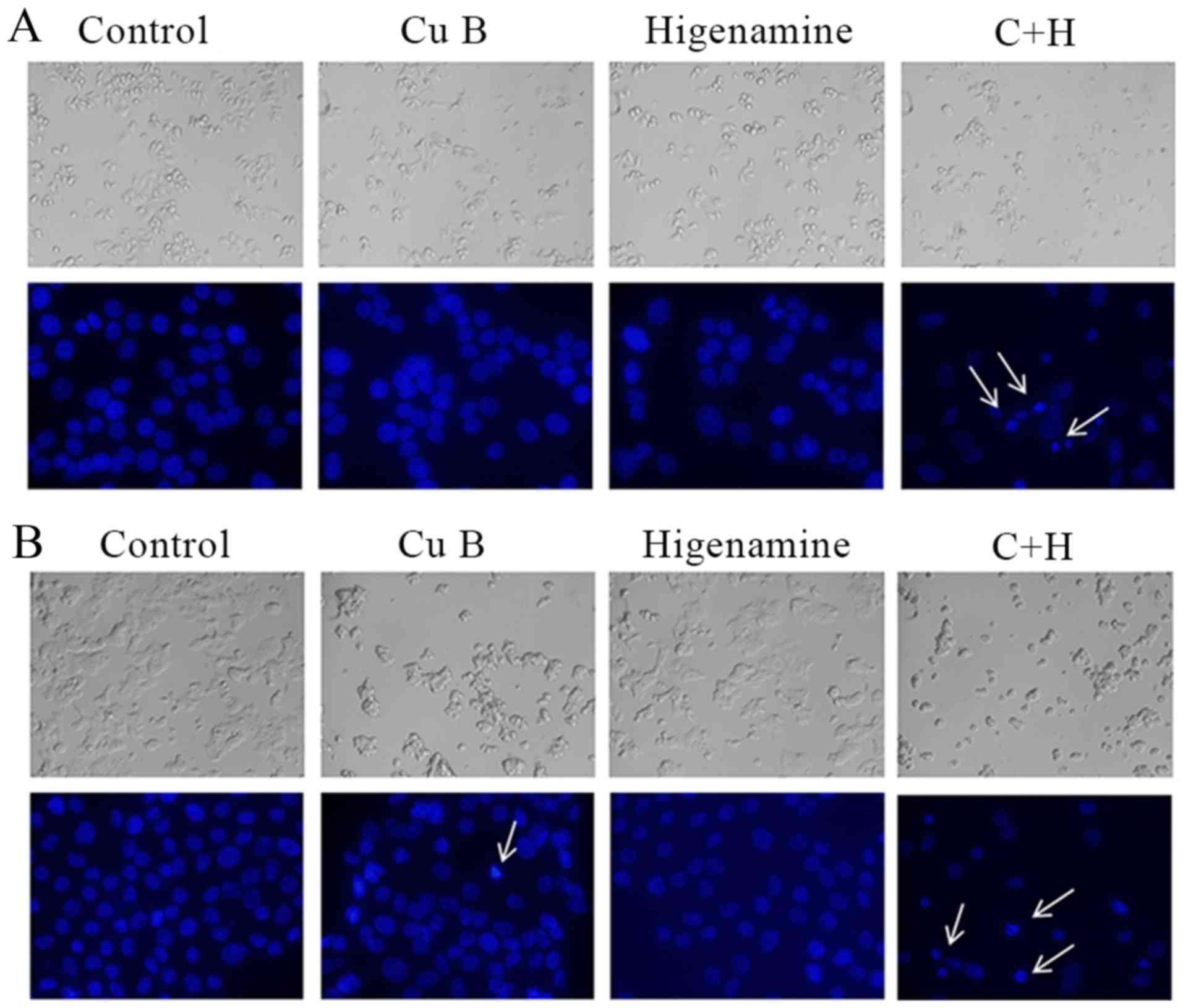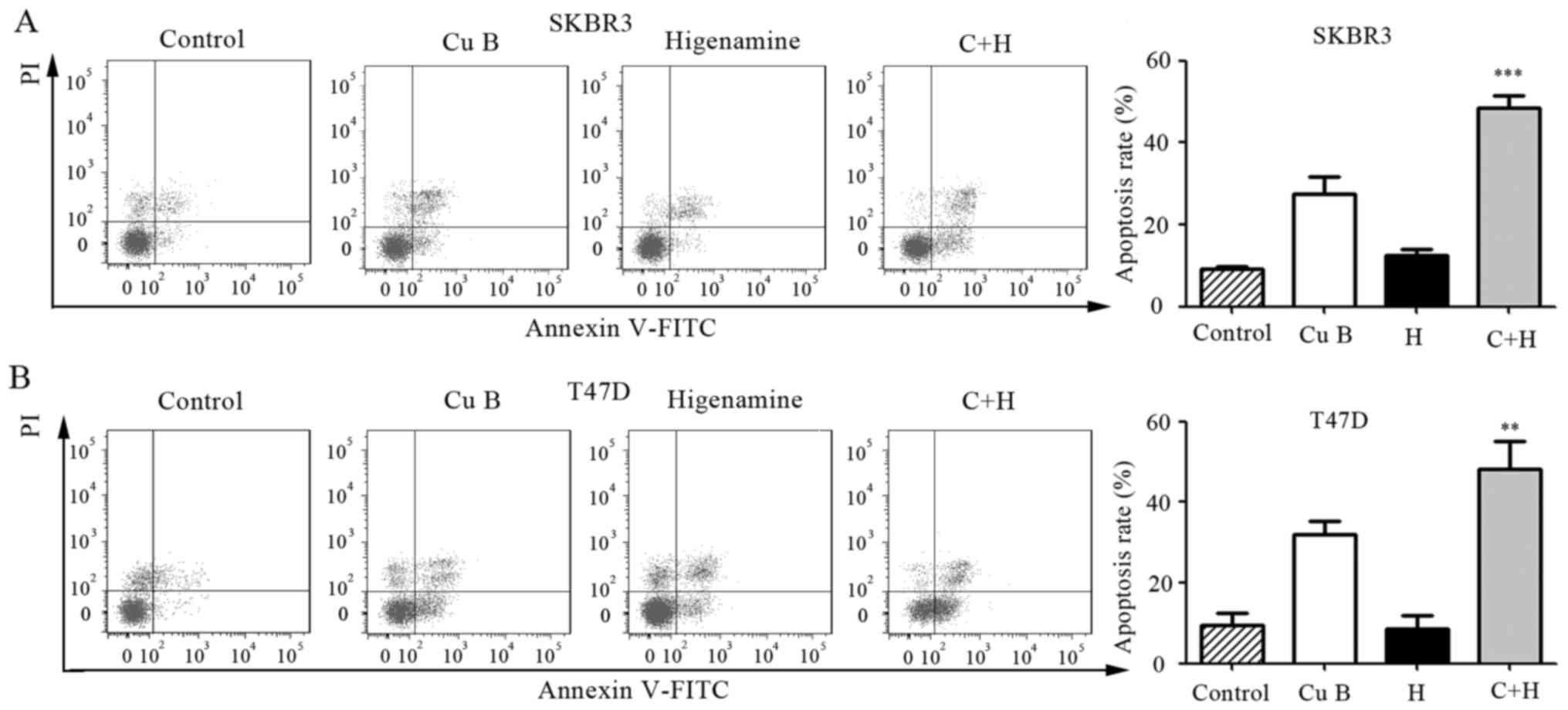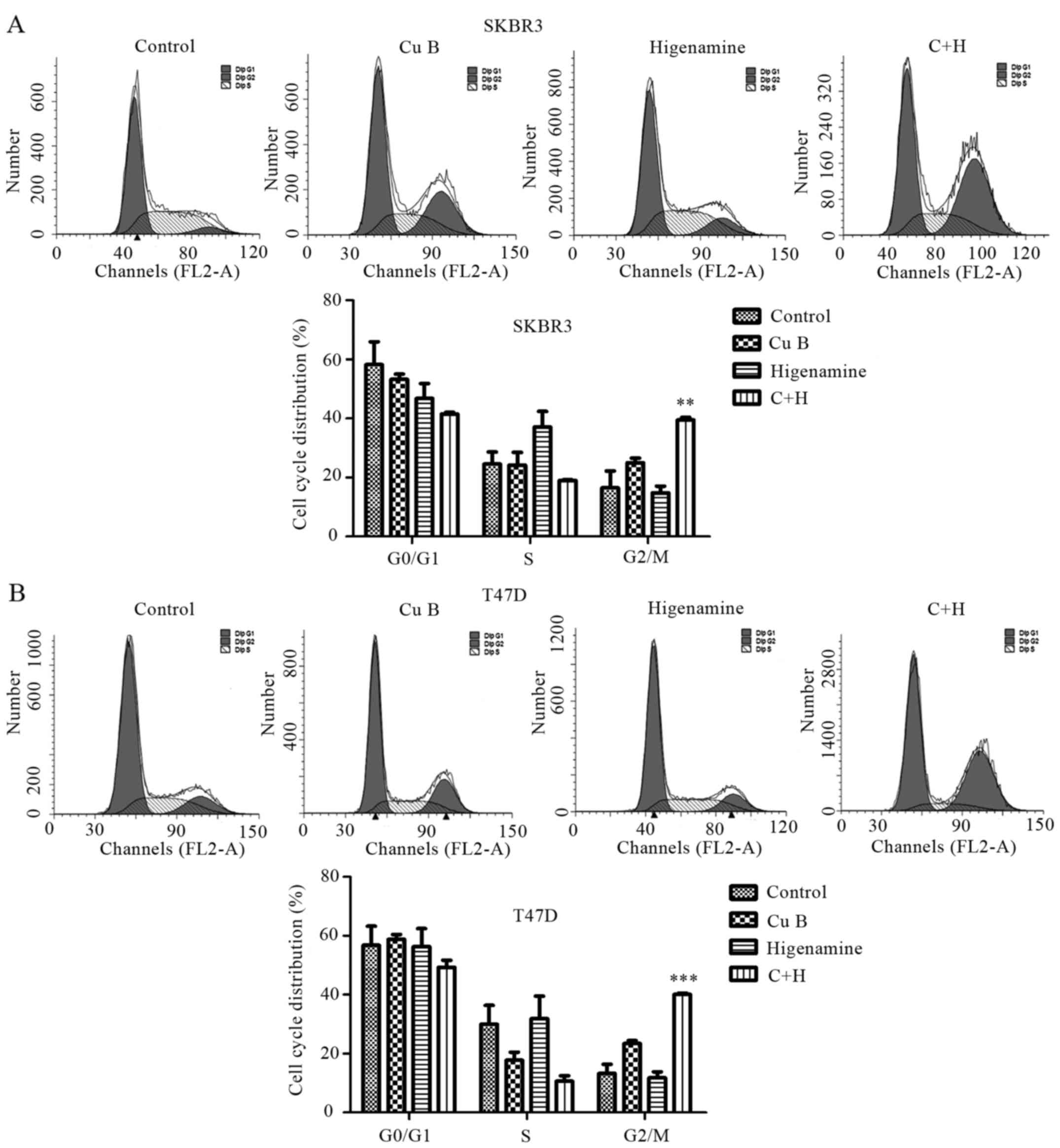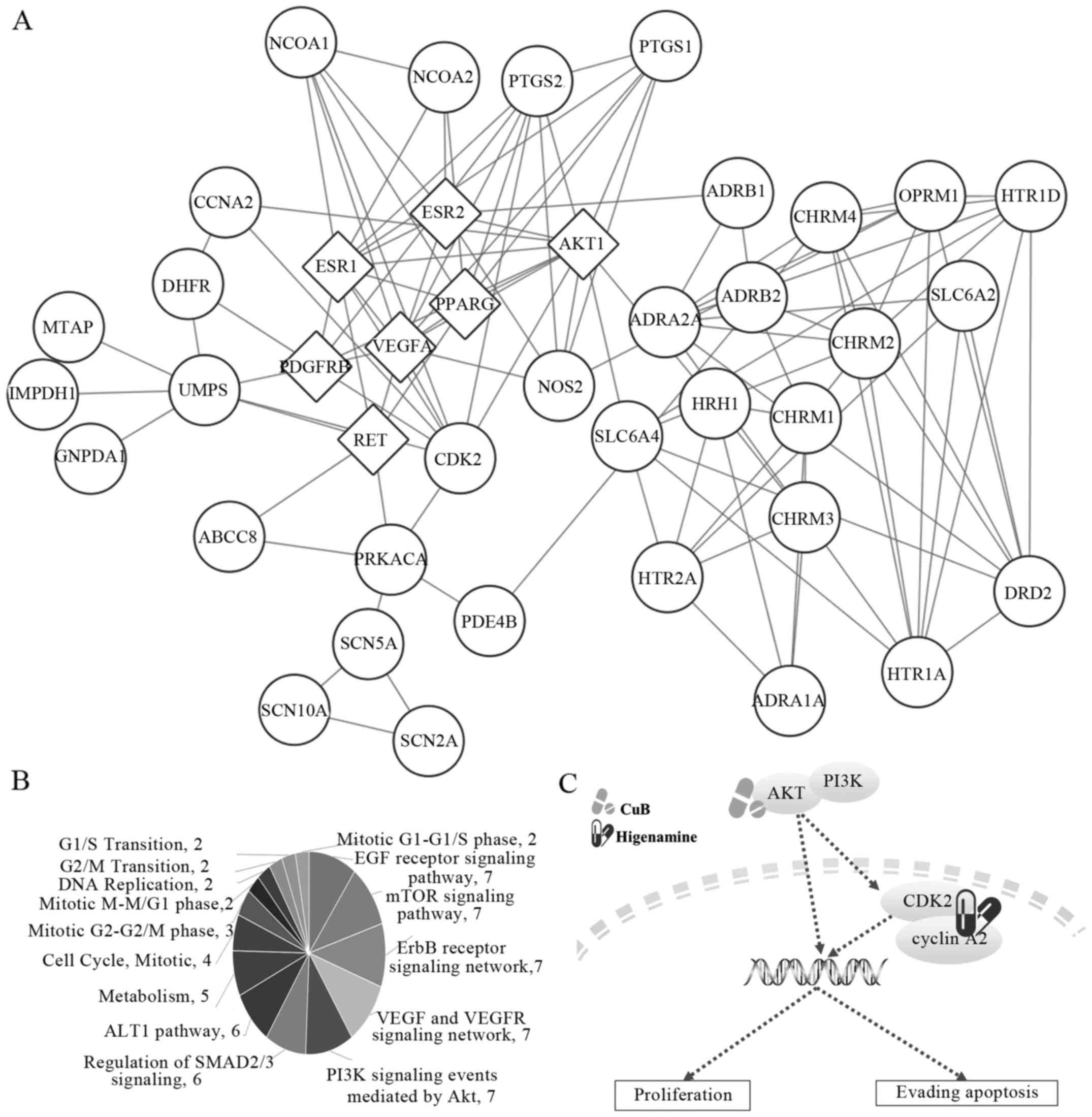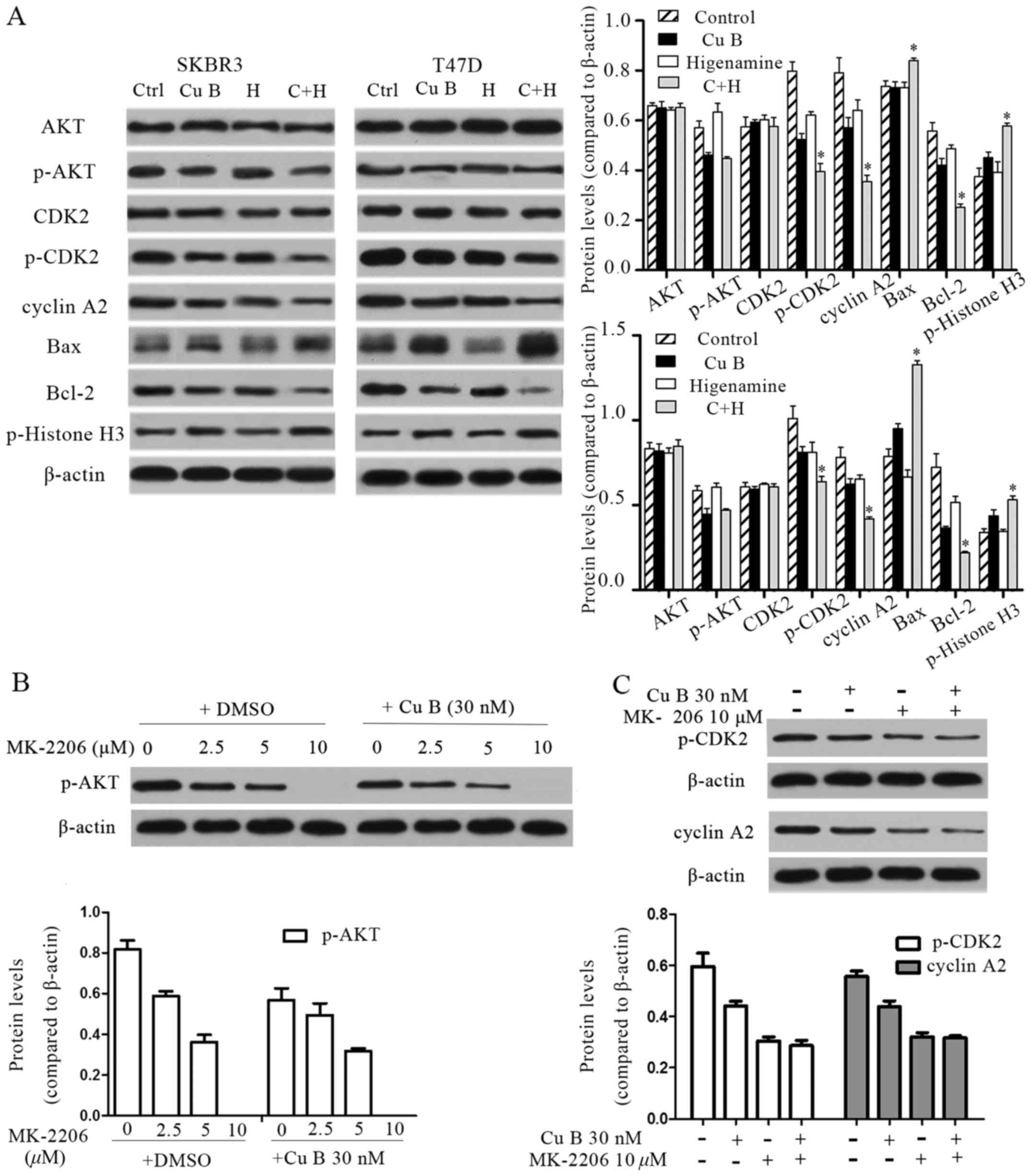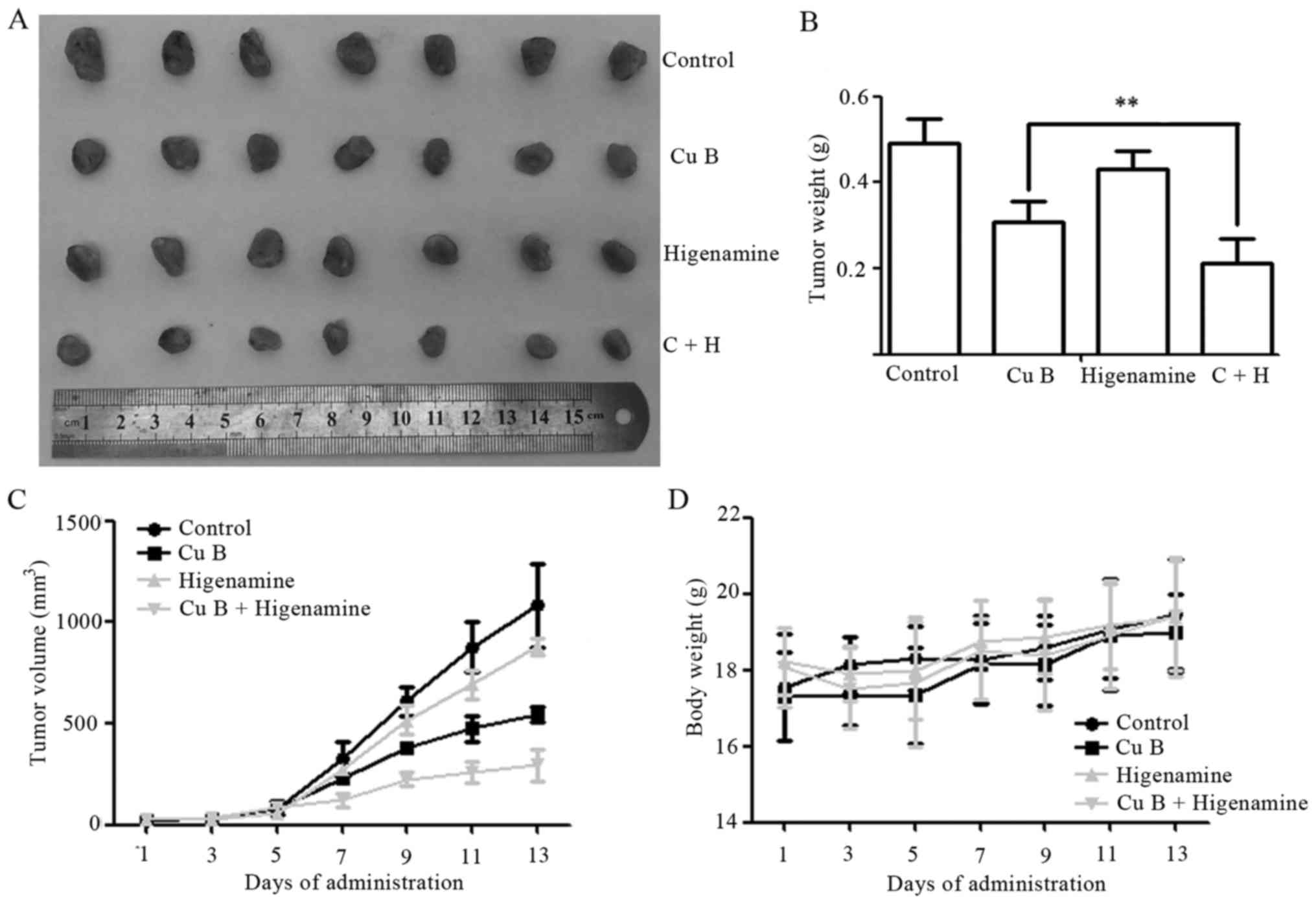|
1
|
Siegel RL, Miller KD and Jemal A: Cancer
statistics, 2018. CA Cancer J Clin. 68:7–30. 2018. View Article : Google Scholar : PubMed/NCBI
|
|
2
|
Sun Y, Zhang J, Zhou J, Huang Z, Hu H,
Qiao M, Zhao X and Chen D: Synergistic effect of cucurbitacin B in
combination with curcumin via enhancing apoptosis induction and
reversing multidrug resistance in human hepatoma cells. Eur J
Pharmacol. 768:28–40. 2015. View Article : Google Scholar : PubMed/NCBI
|
|
3
|
Ding X, Chi J, Yang X, Hao J, Liu C, Zhu
C, Wang X, Liu X, Niu Y, Ji W, et al: Cucurbitacin B
synergistically enhances the apoptosis-inducing effect of arsenic
trioxide by inhibiting STAT3 phosphorylation in lymphoma Ramos
cells. Leuk Lymphoma. 58:2439–2451. 2017. View Article : Google Scholar : PubMed/NCBI
|
|
4
|
Sun SM; Qian Jin, Yi Fang, Jiao Shi, Li
JR, Su L, Ren JL, Jiao ZL and Li PZ: People's Medical Publishing
House. Beijing: pp. 3241998
|
|
5
|
Zhao JC; Sheng Ji, Zong Lu, Zhuan Yao, Yu
YA, Wang LX, Li JR and Wu JH: Anhui: Science & Technology
Publishing House. Anhui: pp. 63–64. 1987
|
|
6
|
Zhang ZJ; Jin Gui, Yao Lue and Fan YS:
Chinese Press of Traditional Chinese Medicine. Beijing: pp.
2232003
|
|
7
|
Kausar H, Munagala R, Bansal SS, Aqil F,
Vadhanam MV and Gupta RC: Cucurbitacin B potently suppresses
non-small-cell lung cancer growth: Identification of intracellular
thiols as critical targets. Cancer Lett. 332:35–45. 2013.
View Article : Google Scholar : PubMed/NCBI
|
|
8
|
Zhou X, Yang J, Wang Y, Li W, Li-Ling J,
Deng Y and Zhang M: Cucurbitacin B inhibits
12-O-tetradecanoylphorbol 13-acetate-induced invasion and migration
of human hepatoma cells through inactivating mitogen-activated
protein kinase and PI3K/Akt signal transduction pathways. Hepatol
Res. 42:401–411. 2012. View Article : Google Scholar : PubMed/NCBI
|
|
9
|
Saglam Yar AS, Alp E, Elmazoglu Z and
Menevse S: Treatment with cucurbitacin B alone and in combination
with gefitinib induces cell cycle inhibition and apoptosis via EGFR
and JAK/STAT pathway in human colorectal cancer cell lines. Hum Exp
Toxicol. 35:526–543. 2016. View Article : Google Scholar : PubMed/NCBI
|
|
10
|
Zhang M, Sun C, Shan X, Yang X, Li-Ling J
and Deng Y: Inhibition of pancreatic cancer cell growth by
cucurbitacin B through modulation of signal transducer and
activator of transcription 3 signaling. Pancreas. 39:923–929. 2010.
View Article : Google Scholar : PubMed/NCBI
|
|
11
|
Zhang N, Lian Z, Peng X, Li Z and Zhu H:
Applications of Higenamine in pharmacology and medicine. J
Ethnopharmacol. 196:242–252. 2017. View Article : Google Scholar : PubMed/NCBI
|
|
12
|
Bai G, Yang Y, Shi Q, Liu Z, Zhang Q and
Zhu YY: Identification of higenamine in Radix Aconiti Lateralis
Preparata as a beta2-adrenergic receptor agonist1. Acta Pharmacol
Sin. 29:1187–1194. 2008. View Article : Google Scholar : PubMed/NCBI
|
|
13
|
Lee SR, Schriefer JM, Gunnels TA, Harvey
IC and Bloomer RJ: Acute oral intake of a higenamine-based dietary
supplement increases circulating free fatty acids and energy
expenditure in human subjects. Lipids Health Dis. 12:1482013.
View Article : Google Scholar : PubMed/NCBI
|
|
14
|
Yuan H, Ma Q, Cui H, Liu G, Zhao X, Li W
and Piao G: How can synergism of traditional medicines benefit from
network pharmacology? Molecules. 22:11352017. View Article : Google Scholar
|
|
15
|
Gong J, Cai C, Liu X, Ku X, Jiang H, Gao D
and Li H: ChemMapper: A versatile web server for exploring
pharmacology and chemical structure association based on molecular
3D similarity method. Bioinformatics. 29:1827–1829. 2013.
View Article : Google Scholar : PubMed/NCBI
|
|
16
|
Bolton EE, Wang Y, Thiessen PA and Bryant
SH: PubChem: Integrated platform of small molecules and biological
activities. Annu Rep Comput Chem. 4:217–241. 2008. View Article : Google Scholar
|
|
17
|
Mao Y, Hao J, Jin ZQ, Niu YY, Yang X, Liu
D, Cao R and Wu XZ: Network pharmacology-based and clinically
relevant prediction of the active ingredients and potential targets
of Chinese herbs in metastatic breast cancer patients. Oncotarget.
8:27007–27021. 2017.PubMed/NCBI
|
|
18
|
von Mering C, Jensen LJ, Snel B, Hooper
SD, Krupp M, Foglierini M, Jouffre N, Huynen MA and Bork P: STRING:
Known and predicted protein-protein associations, integrated and
transferred across organisms. Nucleic Acids Res. 33:D433–D437.
2005. View Article : Google Scholar : PubMed/NCBI
|
|
19
|
Shannon P, Markiel A, Ozier O, Baliga NS,
Wang JT, Ramage D, Amin N, Schwikowski B and Ideker T: Cytoscape: A
software environment for integrated models of biomolecular
interaction networks. Genome Res. 13:2498–2504. 2003. View Article : Google Scholar : PubMed/NCBI
|
|
20
|
Davis AP, Grondin CJ, Lennon-Hopkins K,
Saraceni-Richards C, Sciaky D, King BL, Wiegers TC and Mattingly
CJ: The comparative toxicogenomics database's 10th year
anniversary: Update 2015. Nucleic Acids Res. 43(D1): D914–D920.
2015. View Article : Google Scholar : PubMed/NCBI
|
|
21
|
Pathan M, Keerthikumar S, Ang CS, Gangoda
L, Quek CY, Williamson NA, Mouradov D, Sieber OM, Simpson RJ, Salim
A, et al: FunRich: An open access standalone functional enrichment
and interaction network analysis tool. Proteomics. 15:2597–2601.
2015. View Article : Google Scholar : PubMed/NCBI
|
|
22
|
Liu XJ, Wagner HN Jr and Tao S:
Measurement of effects of the Chinese herbal medicine higenamine on
left ventricular function using a cardiac probe. Eur J Nucl Med.
8:233–236. 1983. View Article : Google Scholar : PubMed/NCBI
|
|
23
|
Feng S, Jiang J, Hu P, Zhang JY, Liu T,
Zhao Q and Li BL: A phase I study on pharmacokinetics and
pharmacodynamics of higenamine in healthy Chinese subjects. Acta
Pharmacol Sin. 33:1353–1358. 2012. View Article : Google Scholar : PubMed/NCBI
|
|
24
|
Kang YJ, Lee YS, Lee GW, Lee DH, Ryu JC,
Yun-Choi HS and Chang KC: Inhibition of activation of nuclear
factor kappaB is responsible for inhibition of inducible nitric
oxide synthase expression by higenamine, an active component of
aconite root. J Pharmacol Exp Ther. 291:314–320. 1999.PubMed/NCBI
|
|
25
|
Ni L, Zhu X, Gong C, Luo Y, Wang L, Zhou
W, Zhu S and Li Y: Trichosanthes kirilowii fruits inhibit
non-small cell lung cancer cell growth through mitotic cell-cycle
arrest. Am J Chin Med. 43:349–364. 2015. View Article : Google Scholar : PubMed/NCBI
|
|
26
|
Oh H, Mun YJ, Im SJ, Lee SY, Song HJ, Lee
HS and Woo WH: Cucurbitacins from Trichosanthes kirilowii as
the inhibitory components on tyrosinase activity and melanin
synthesis of B16/F10 melanoma cells. Planta Med. 68:832–833. 2002.
View Article : Google Scholar : PubMed/NCBI
|
|
27
|
Maddika S, Ande SR, Wiechec E, Hansen LL,
Wesselborg S and Los M: Akt-mediated phosphorylation of CDK2
regulates its dual role in cell cycle progression and apoptosis. J
Cell Sci. 121:979–988. 2008. View Article : Google Scholar : PubMed/NCBI
|
|
28
|
Sliva D, Jedinak A, Kawasaki J, Harvey K
and Slivova V: Phellinus linteus suppresses growth, angiogenesis
and invasive behaviour of breast cancer cells through the
inhibition of AKT signalling. Br J Cancer. 98:1348–1356. 2008.
View Article : Google Scholar : PubMed/NCBI
|
|
29
|
Zakikhani M, Blouin MJ, Piura E and Pollak
MN: Metformin and rapamycin have distinct effects on the AKT
pathway and proliferation in breast cancer cells. Breast Cancer Res
Treat. 123:271–279. 2010. View Article : Google Scholar : PubMed/NCBI
|
|
30
|
Caffarel MM, Andradas C, Mira E,
Pérez-Gómez E, Cerutti C, Moreno-Bueno G, Flores JM, García-Real I,
Palacios J, Mañes S, et al: Cannabinoids reduce ErbB2-driven breast
cancer progression through Akt inhibition. Mol Cancer. 9:1962010.
View Article : Google Scholar : PubMed/NCBI
|
|
31
|
Teixeira C and Pratt MA: CDK2 is a target
for retinoic acid-mediated growth inhibition in MCF-7 human breast
cancer cells. Mol Endocrinol. 11:1191–1202. 1997. View Article : Google Scholar : PubMed/NCBI
|
|
32
|
Tetsu O and McCormick F: Proliferation of
cancer cells despite CDK2 inhibition. Cancer Cell. 3:233–245. 2003.
View Article : Google Scholar : PubMed/NCBI
|
|
33
|
Ortega S, Prieto I, Odajima J, Martín A,
Dubus P, Sotillo R, Barbero JL, Malumbres M and Barbacid M:
Cyclin-dependent kinase 2 is essential for meiosis but not for
mitotic cell division in mice. Nat Genet. 35:25–31. 2003.
View Article : Google Scholar : PubMed/NCBI
|
|
34
|
Berthet C, Aleem E, Coppola V, Tessarollo
L and Kaldis P: Cdk2 knockout mice are viable. Curr Biol.
13:1775–1785. 2003. View Article : Google Scholar : PubMed/NCBI
|
|
35
|
Liang J and Slingerland JM: Multiple roles
of the PI3K/PKB (Akt) pathway in cell cycle progression. Cell
Cycle. 2:339–345. 2003. View Article : Google Scholar : PubMed/NCBI
|















